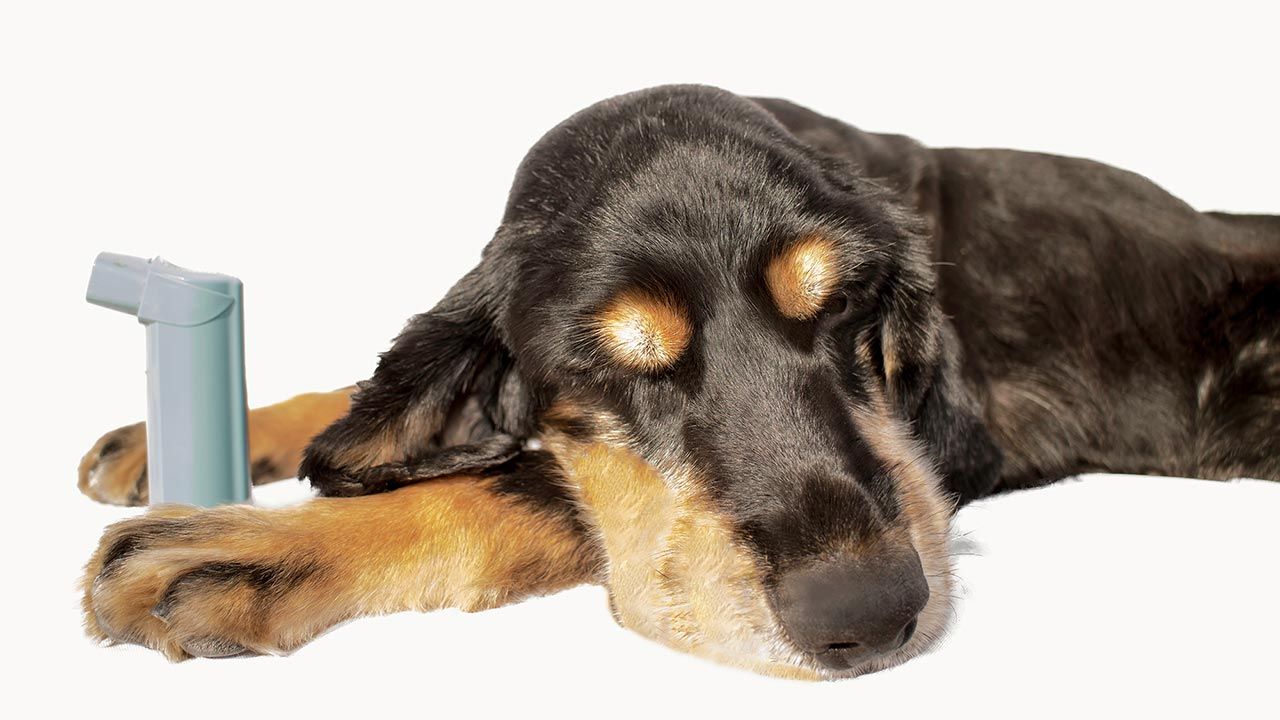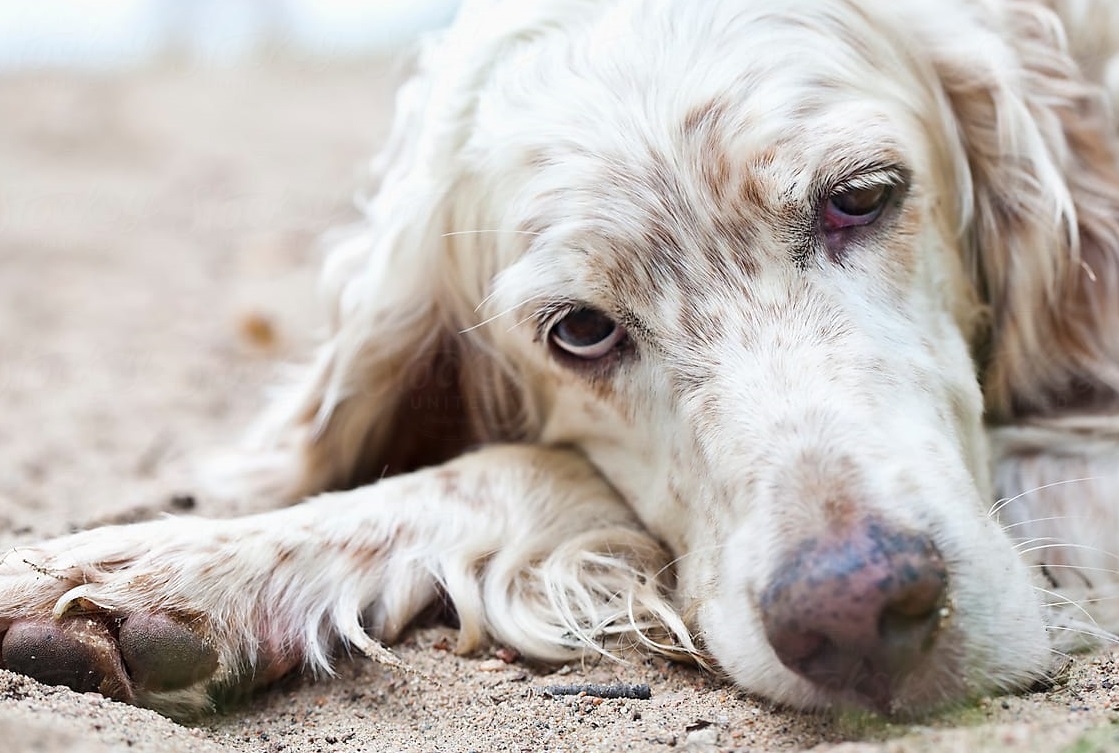Basically, canine bronchitis is a disease that consists of inflammation of the bronchi, which are part of the respiratory tract of these animals. However, as much as it sounds like a fairly simple situation, the reality is that this disease can become very lethal if it is not treated on time and with the advice of a professional. If you want to learn more about bronchodilators for dogs, continue reading this article.

bronchodilators for dogs
The bronchi are branches of the trachea which allow air to enter and leave the lungs constantly. Below you will be able to know all the symptoms of this dangerous disease, and above all, what you must do to maintain your dog's health in the most optimal state possible, basic prevention, all treatment with bronchodilators and the symptoms that this disease presents .
Types of Bronchitis in Dogs
Bronchitis in dogs can come in two different forms, chronic bronchitis or acute bronchitis. In the case of acute bronchitis, it has a relatively short duration and all the injuries in the airways can be repaired without the need for very strong treatment, unlike what can happen with chronic bronchitis.
Chronic bronchitis
Chronic bronchitis is considered one of the most recurrent respiratory tract diseases in these canines. This disease usually has a long duration of approximately two or three months and normally, it usually causes different irreversible lesions in all the respiratory tract. The most common is that it is associated with a chronic cough and excessive mucus production. The breeds most predisposed to suffer from all kinds of respiratory diseases, and especially chronic bronchitis, are the following that will be mentioned:
- Pomeranian
- Yorkshire Terrier
- Caniche
- Chihuahua
- Pekines
All these dogs have, on average, quite small sizes, therefore, they are very predisposed to suffer at some point in their lives from diseases in the respiratory tract, diseases that can also worsen the entire picture of chronic bronchitis, as can be the mitral insufficiency of the heart and also the collapse of the trachea.
Main Symptoms
Among all the symptoms that this disease presents, we find some such as those that will be mentioned below:
- Tachypnea, that is, a fairly rapid breathing.
- A moderate cough, or a very severe cough. It all depends on the specific case.
- In the most severe cases, a purple mucosa can be seen.
- Very difficult to breathe
- Some lung sounds will start to sound much louder or become distorted, this should be noted by your vet at the time you bring your pet to him.
Normally, the main reasons why the vast majority of dog owners usually go to a veterinarian is unrestrained and intense coughing, and also because of the high production of mucus that an infected dog can present. As these symptoms are very characteristic of many other diseases, it is always best to go quickly to a veterinarian, who will do all the pertinent tests to provide you with a more accurate diagnosis and will prescribe everything you need to treat the condition. You must bear in mind that over the years, in the case of chronic bronchitis, the cough could get much worse.
Diagnosis of bronchitis
The most normal thing is that your veterinarian is based on all the medical signs and the coughing episodes that your dog has had, to diagnose exactly if it is bronchitis. In addition to this diagnosis, the veterinarian must also try to find the cause that is causing the disease, which could be idiopathic, that is, a completely unknown cause, or it could also be a consequence of some disease that the dog has previously had. be treated quickly, among these diseases we find some such as the following:
- mycoplasma infection
- Dirafilariasis
- allergic bronchitis
- Bacterial infection
One of the methods by which your veterinarian may choose is to perform an X-ray on your dog, and in this way, be able to clearly observe all the possible changes in the animal's respiratory tract. Despite this, in several cases of bronchitis in dogs, none of these possible changes are manifested, and therefore, this test could be completely useless. Despite this, in the most serious cases, different tests are needed to rule out other possible much more serious diseases. Among all these tests, we find some such as the following:
- Biopsy
- Tracheobronchial lavage culture
- Bronchopulmonary cytology
- bronchoscopy
Transmission
The treatment that is used for bronchitis in dogs is quite non-specific, that is, it has to be adapted exactly to the case of your dog, since this treatment has the main objective of relieving all the symptoms that may be presenting. In this way, in the event that you want to learn how to treat canine bronchitis correctly, you must first know very well that there is not only one way to do it and therefore, it depends entirely on the particular case of your pet.
The most normal thing is that the veterinarians prescribe a treatment mainly with bronchodilators, corticosteroids, and on many other occasions, an antibiotic for canine bronchitis may also be applied. The most severe cases of this disease may require oxygen through a mask, and it may even be necessary to administer a series of medications intravenously, that is, directly into the dog's veins using a catheter.
Now, on the side of steroids, these are mostly used to reduce a little all the inflammation of the bronchi, which is the main cause of the thickening of the mucous membranes that are found throughout the respiratory tract, causing an exaggerated production of mucus. and also a very intense cough.
However, it is very important to be very careful, and for this reason, you must follow exactly all the recommendations provided by your veterinarian, since the vast majority of these medications bring with them various side effects that are somewhat annoying for your dog. However, the veterinarian could also choose to prescribe a series of sprays that contain different medications to treat canine bronchitis, these are usually very effective against this disease.
Bronchodilators will be prescribed whenever there is bronchial constriction. These products can be easily applied through inhalation, as mentioned above, since this means it has far fewer adverse side effects and far fewer risks than the oral route.
home remedies for bronchitis
As a complement to all the treatment that your trusted veterinarian has already prescribed, you can choose to use a few home remedies to treat bronchitis in dogs. All these natural remedies are designed with the main objective of relieving all coughing episodes that your pet may have, which, in turn, is the main symptom of this disease and is also probably the most annoying sign of all. Of course, before applying any of these remedies, you should always consult your veterinarian first and he will tell you if you can do it or not.
Mint tea
Even for humans, mint is usually a highly recommended plant to treat any symptom that may cause respiratory disease, this is because mint helps clear the airways thanks to all its expectorant and decongestant properties. To apply this remedy, all you have to do is prepare a simple homemade mint tea and give your dog a couple of these drops in his mouth directly, for this you can use a dropper or a syringe.
Tea tree oil
In addition to mint, another of the most recommended and effective plants to treat all these respiratory symptoms, and which also has great expectorant properties, is tea tree oil. This substance mainly favors to a great extent the liberation of all the respiratory tracts, fighting with all the mucus that may have accumulated in them.
Now, in order to correctly treat bronchitis in dogs using this home remedy, it is best to create steam or mist. To do this, you could lock yourself in the bathroom with your dog and, for example, you could fill the bathtub with some fairly hot water, enough to generate a good amount of steam, once you've added the hot water. , you will only have to add a few drops of the oil, always being alert not to exceed the dose and very aware of your dog's behavior.
Another option could be to heat a pot of water until it starts to boil, pour in a few drops of tea tree oil, and leave this pot in a closed room with your dog so that it can inhale all this steam.
However, it is very important that you are always present with your dog throughout the process for various reasons. Firstly, to prevent your dog from getting burned by the hot water, secondly, so that your dog feels completely comfortable by your side and does not start to get stressed by confinement, thirdly, so that you can control first-hand the state in which the canine is. It should be noted that you should not place your dog right next to the steam source, only if it is a closed space and that it can inhale the steam, it will be more than enough.
Coconut oil
In addition to helping to treat this unfortunate disease, coconut oil can also help strengthen your dog's immune system, this substance can very well relieve the cough that occurs with canine bronchitis and also greatly helps the animal to gradually recover all your energy and all your vitality. To effectively apply this home remedy, all you have to do is dilute one or two tablespoons of this coconut oil in a bowl of water and allow your pet to start drinking slowly.
Honey
In the same way that for humans, honey is usually one of the best known and recommended home remedies all over the world, for dogs it also provides a number of very useful medicinal properties to combat these horrible diseases. Now, it is very important that this is only natural honey or organic honey, which does not contain any type of added sugars or preservatives.
After mentioning all this, all you have to do is give your little dog a spoonful of honey approximately every four or five hours, you must be very careful not to exceed the doses to avoid any type of stomach damage in the medium term. Now, if your dog is suffering from bronchitis and is not even a year old, do not use this remedy under any circumstances, because it is contraindicated in any type of puppy.
prevention of bronchitis
Despite the fact that the most normal thing is that this disease occurs due to a genetic predisposition of each dog, there are several things that it is best that you avoid, if you want your dog to maintain the best possible respiratory health. Among all these things we find some such as the following:
- aerosols
- chimney smoke
- Tobacco
- air fresheners
- Perfumes
- Other types of vapors
To simplify everything, you should avoid any type of substance that could minimally irritate the respiratory tract of your furry pet, especially if on several occasions you have come to see how your dog coughs or sneezes regularly, since any of these products could get to trigger a canine bronchitis in him.
If you want to learn much more about all the animals throughout the planet, do not think for a moment to leave this page without first having read one of these three wonderful articles:
My dog has diarrhea and vomiting.



